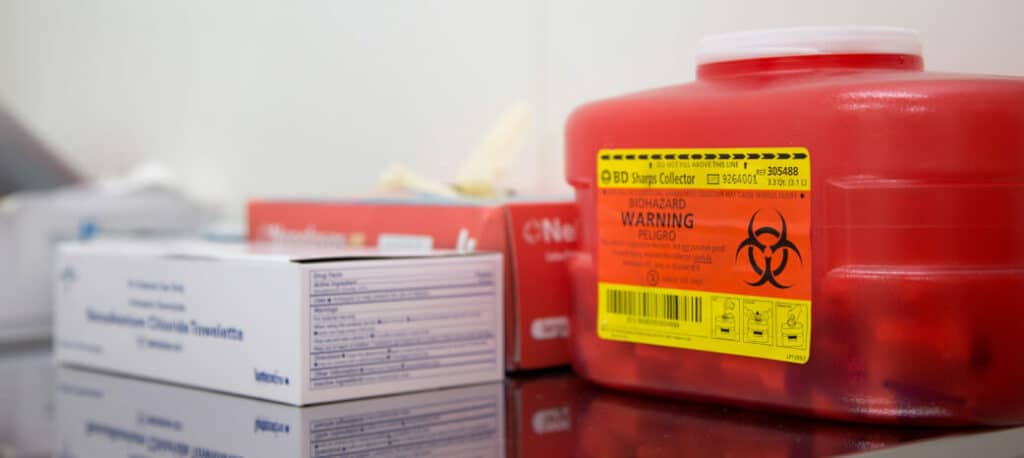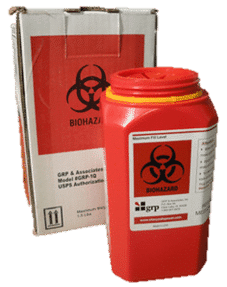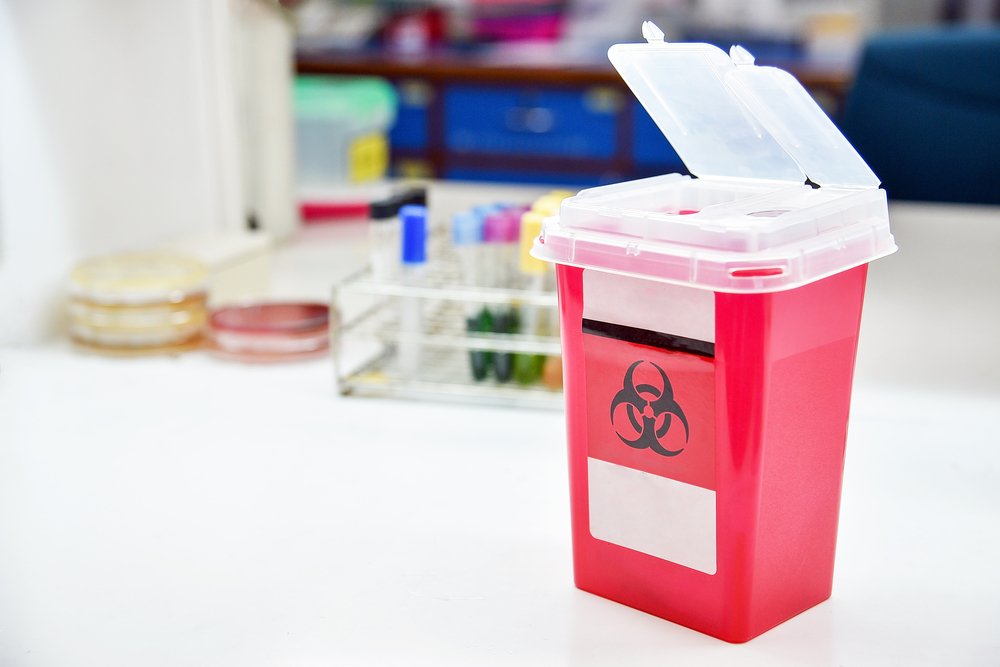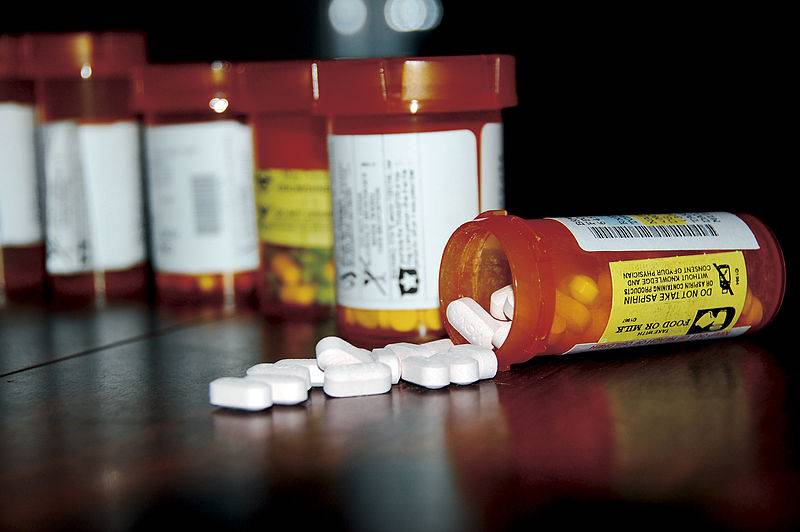Medical Waste Disposal Oklahoma City, OK
MedPro Disposal helps healthcare providers in Oklahoma City, OK save an average of 30% on their medical waste disposal.
Oklahoma City, Oklahoma Medical Waste Disposal Services
MedPro Disposal offers medical waste disposal, infectious sharps waste management, OSHA compliance training including bloodborne pathogens training and certification, and HIPAA-compliance document shredding and data destruction services. MedPro Disposal keeps your practice safe and compliant so you can focus on what matters most, your patients.
Industries We Service
Take the MedPro Disposal challenge!
See how much MedPro Disposal can save your practice!
It’s Easy to Get Started With MedPro Disposal

Contact Us
Contact MedPro Disposal for a fast, free medical waste removal quote. We’ll get to know you, discuss your needs, and settle on a number. You may be surprised at how much you can save on medical waste disposal with MedPro Disposal.

Waste Pickup Date
Work with MedPro Disposal to determine your first pickup date. We’ll confirm your office hours and provide convenient options for medical waste and sharps pickup.

Compliance Survey
Complete a compliance survey. After we get to know your requirements, we’ll send you a survey to identify any areas that need to be brought up to OSHA standards.
All three steps occur at no additional cost to your practice. You’re on your way to safe, affordable, compliant medical waste removal!
Contact MedPro Disposal Today for a Fast, Free Quote!
Oklahoma City, OK
Oklahoma City is the capital of the U.S. state of Oklahoma and its largest city. The county seat of Oklahoma County, the city ranks 29th among United States cities in population. As of the 2012 census, the population was 599,199. In 2010 the Oklahoma City metropolitan area had a population of 1,252,987, and the Oklahoma City-Shawnee Combined Statistical Area had a population of 1,322,249 residents, making it Oklahoma’s largest metropolitan area.
| Practice Type | Zip Code | Projected Annual Savings |
|---|---|---|
| Manufacturing Facility | 73099 | $5,400 |
| Allergist | 73104 | $1,794 |
| Cancer Treatment Center | 73170 | $9,900 |
Find Out How Much You Can Save Instantly
Try our on-line savings calculator.

Oklahoma City (OKC) is the largest, most populated city in the state and home to over 600,000 “Okies”. The city embraces its rugged Western past and to this day still celebrates its rich cowboy culture that makes it the “Horse Show Capital of the World”. Oklahoma means, “Land of the Red People” in the Choctaw Language and OKC has a diverse Native American population. The city is home to over 60 tribes and ever year hosts the Red Earth Native American Cultural Festival.
The Oklahoma Health Improvement Plan, initiated in 2010, focuses on making improvements in key strategic areas and creating a culture of health. Their goal is to help Oklahomans live healthier, happier and longer lives. With that emphasis on ensuring the health and safety of Oklahomans, the state is now one of 26 states covered entirely by the federal OSHA program for the handling, management and disposal of medical waste.
Medical Waste Disposal Oklahoma City, OK
Medical waste disposal in OKC is regulated by several state agencies. The Oklahoma Department of Environmental Quality defines and manages medical waste regulations and hospital standards are maintained by the Oklahoma State Department of Health. Regulated medical waste is defined as a waste or reusable material that contains an “etiologic agent” and is generated in the diagnosis, treatment or immunization of human beings or animals. The term “etiologic agent” is not seen in many other state definitions, but essentially refers to any infectious substance.
Regulated medical waste includes, but is not limited to:
- Human blood, blood products, and human body fluids – such as used blood collection bags, tubes and vials
- Pathological wastes – such human tissues, organs, and body parts removed during surgery
- Untreated sharps – such as used IV cannula
- Contaminated carcasses – such as animal body parts. This includes bedding of animals intentionally exposed to pathogens in research.
- Products contaminated with blood or other bodily fluids – such as blood soaked bandages. Bodily fluids do not include feces and urine.
Hospital Standards
Oklahoma City hospitals are bound by the Oklahoma State Department of Health hospital standards. This broad set of regulations ensures that each hospital has an infection control policy in order to maintain a sanitary environment and avoid sources and transmission of infections. Hospital programs must include written policies and procedures for identifying and reporting all infections among patients and staff. They must include procedures to ensure that isolation and sanitation techniques are reviewed and kept up to date. All hospital personnel must be trained in infection control practices and their training documented.
The standards also require that the infection control program include specific policies related to the handling of biohazard waste disposal. Although no specific guidance is provided, the state operates under the federal OSHA program.
It’s OK To Be Confused
Managing your medical waste in Oklahoma can be confusing because healthcare facilities are not required to obtain a Department of Environmental Quality (DEQ) permit and are not subject to DEQ storage requirements. However, OSHA storage requirements do apply and specify requirements for management of sharps, storage containers the correct use labels and bags.
The rules for regulated medical waste processing facilities are different, and much stricter. Processing facilities are required to hold an Oklahoma DEQ permit and are bound by much stricter storage, treatment and processing requirements than healthcare facilities, such as a 24 hour timeframe for processing or refrigerating waste following its delivery. These stricter requirements make the medical waste disposal process far more complex, and as a result, far more expensive. It is for this reason that many Oklahoma City healthcare facilities, including veterinary clinics and funeral homes, choose to use a medical waste disposal company to fulfill their biohazard waste disposal needs.
Individuals generating household levels of waste (60 pounds per month or less) may use the municipal solid waste (regular trash), but should take steps to ensure the waste does not pose a risk to handlers of the waste. For example, sealing used sharps in a puncture proof containers to ensure waste handlers are not stabbed.

Treating It Properly
In early 2015, a disturbing discovery of syringes, needles and vials of blood washed up on to the shore along the Arkansas River. The medical waste had been found scattered on various banks between Ralston and Cleveland, and the biohazardous material may have come from a Tulsa hospital. Incidents like these highlight the need treat and dispose of medical waste properly to ensure it no longer poses a risk to the environment or local population.
Regulated medical waste must be treated using one of the following methods:
- Incineration – in an incinerator that is designed for the destruction of regulated medical waste. Incinerators use extremely high temperatures to kill bacteria. At such high temperatures, no bacteria are able to survive and the items are deemed safe for recycling or disposal.
- Microwave sterilization – or steam sterilization, use high temperature and pressure to achieve microbial inactivation.
- Chemical disinfection – where contact time, concentration and quantity of the disinfectant are sufficient to consistently achieve microbial inactivation.
Incinerators are almost always required for the destruction of pathological waste, but they are large and expensive pieces of equipment. In Oklahoma City two or more nearby hospitals may share incinerators, but healthcare facilities usually make arrangements with licensed medical waste disposal companies who collect the waste and take it away for disposal.
Let MedPro Disposal Relieve Your Disposal Stress
Medical waste disposal is not an easy job, but here at MedPro Disposal, Oklahoma City, it’s what we do. We can provide you with a flexible pick-up and disposal schedule that is customized to your needs. We offer a reliable, yet low cost alternative to other companies and our specialist disposal experts will never sign you up for more services than you need.
Proper waste disposal can be a stressful concern, but it doesn’t need to be. Our reputation in OKC has been built on our unparalleled customer and we will work with your organization to create a customized plan that will relieve you of this worry. Our OSHA employee training will make sure your staff know what they are doing and ensure waste is disposed of safely at your facilities. Whatever your requirements, MedPro Disposal is ready to deliver.
Oklahoma City, OK Local Resources
Health Department
Health Department

921 Northeast 23rd Street Oklahoma City, OK 73105

405-427-8651
Chamber of Commerce
Chamber of Commerce

201 North Shartel Oklahoma City, OK 73102

405-713-1000
Oklahoma County Medical Society
Oklahoma County Medical Society

313 Northeast 50th Street Suite 2 Oklahoma City, OK 73105

405-702-0500
Supply and Other Resources for Oklahoma City
Coffee Slingers
Coffee Slingers

1015 North Broadway Avenue Oklahoma City, OK 73102

405-609-1662
Sheriff’s Office
Sheriff’s Office

201 North Shartel Oklahoma City, OK 73102

405-713-1000
Bill Warren Office Products
Bill Warren Office Products

1233 Sovereign Row Oklahoma City, OK 73108

405-947-5676
Oklahoma City Little-Known Facts
Oklahoma City was settled on April 22, 1889, when the area known as the “Unassigned Lands” was opened for settlement in an event known as “The Land Run”. Some 10,000 homesteaders settled the area that would become the capital of Oklahoma. The town grew quickly; the population doubled between 1890 and 1900. Early leaders of the development of the city included Anton Classen, John Shartel, Henry Overholser and James W. Maney.
Why Choose MedPro Disposal for Medical Waste & Sharps Container Disposal?
Methods of Oklahoma City Medical Waste Disposal
On-site Medical Waste Collection
Package medical waste on-site, then leave it for collection by a medical waste disposal company.
Mailback Waste Disposal
Properly package and label the sharps, then send the biohazardous waste safely through the mail for disposal.

















